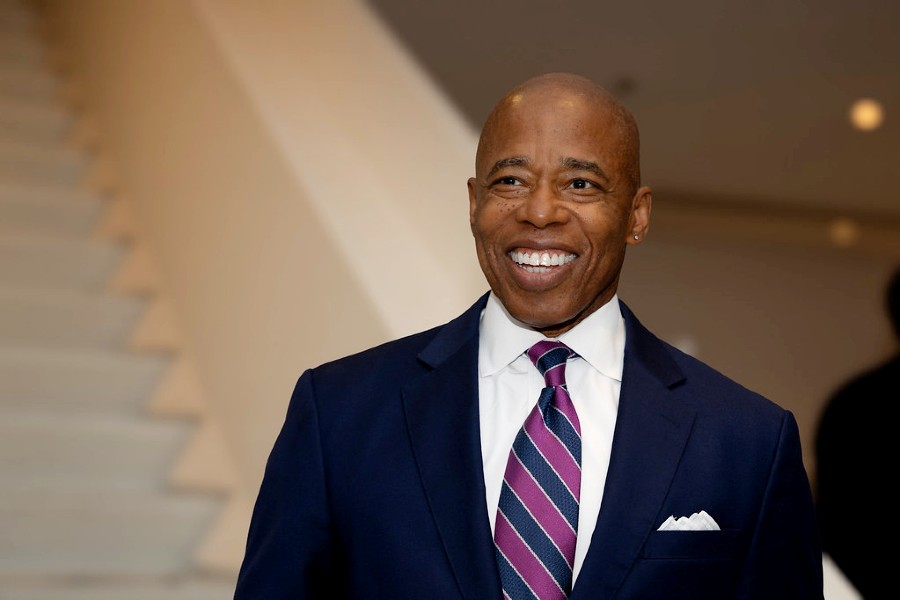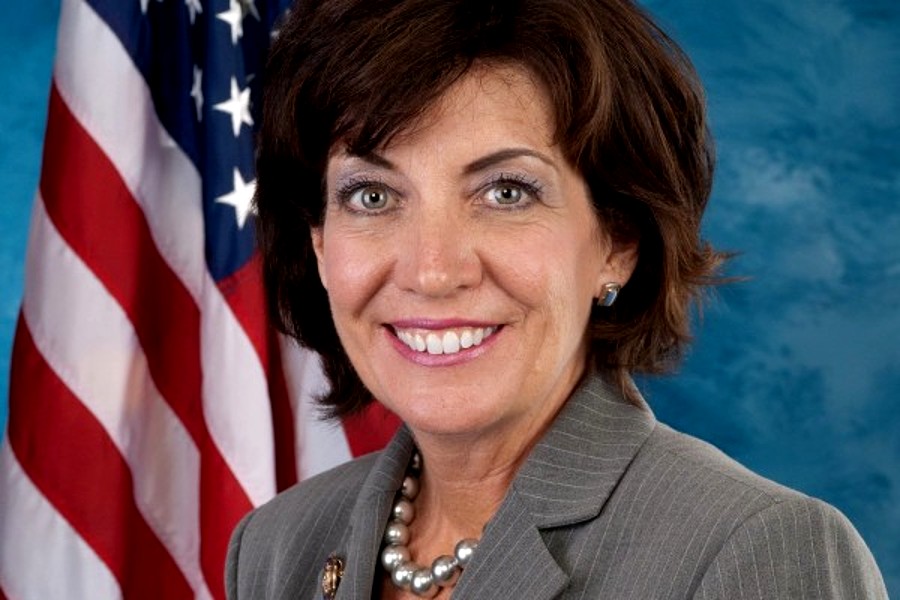By Hector Tobar
U.S. Rep. Adriano Espaillat is the first Dominican member of the United States Congress. As part of an exploration of rising political power among Latino Americans, National Geographic interviewed Espaillat about his life and experience.
Hector Tobar: Being the first Dominican elected to Congress, what did that feel like when you walked up those steps to the Capital for the first time, thinking of Dominican history and all the contributions of the Dominican community to this country?
Adriano Espaillat: I thought of my grandparents and how sad I was that they weren’t there. They were both factory workers and I think they helped me build the mental toughness to make this journey possible. But it was a great experience obviously to see the Capital lit up at night, almost surreal.
My grandmother was a seamstress, who worked in the garment district and my grandfather worked in the (Ray-Ban sunglasses) factory. My father worked in a gas station, my mother (stayed) at home. Eventually my father owned the gas station, so he became a small business owner, and that’s who we were. All of us lived together in the same four-bedroom apartment at the edge of Washington Heights, 153rd St. and Broadway.
HT: Now, I read somewhere that Spanish is your first language and that when you went to school you were a mono-lingual Spanish speaker, correct?
AE: That’s correct, there wasn’t bilingual education back then, and so, when you got here, in those years, they took a grade from you. And then of course, they didn’t have bilingual education so you sat in the back of the classroom for a good amount of time without knowing really what was being said until you found your way through. I was very grateful of the Puerto Rican students that were there because they were helpful to me in navigating the school system at that early age.
HT: Did you understand then that being Dominican and being Puerto Rican was a little bit similar but also different in many ways?
AE: The superintendent of our building was Puerto Rican, the guy that owned the grocery on the corner was also Puerto Rican. Many people don’t know that now because they weren’t part of the original soul-like experience of the Latino community back in the 60s, but the Puerto Ricans really were the pioneers that helped us and opened the doors for many of us.
HT: It’s been reported that you’re the first formerly undocumented person elected to Congress. So how did that happen? What was your immigration status during part of your childhood and how did your family sort that out?
AE: My grandparents were here even before I was born. They came here on a visitor’s visa and the visa expired, so we were here without any documents, and then they petitioned for us. We had to go back to DR eventually to get our green card.
HT: And so do you remember what it was like during those years in which your status was up in the air? Was there an element of uncertainty or fear attached to being undocumented?
AE: Well, I think in so many ways kids are sometimes are immune to that. They don’t really sense the full level of fear as adults may particularly since the environment then wasn’t as hostile as say now. Maybe now, they are a little bit more apprehensive, and scared. I think what was most terrifying was going back to the DR, while there was still a civil war going on there in ‘65, and not knowing whether you know we would be able to come back.
HT: Well that’s similar to the experience of people from many countries in Latin America now and many people who live in your district. Yes?
AE: That’s correct, and now it’s even augmented by the fact that there’s this harsh language out there, this intolerant tone out there that makes it kind of hard for people to get up in the morning and leave and go to work if you’re in transition.
HT: Do you think it’s part of your job to explain some of the myths about immigration and some of the issues facing Latino immigrants?
AE: I think it’s very much part of my job. The fact that I’m there speaks for itself. It speaks volumes that I’m a duly elected member of Congress and have the same power of vote that any other member has across the country. That in itself sets the tone for me to be able to explain my story and what it is to be in this predicament and I think it may even open up the door for some people to understand it a little bit better.
HT: What do you say to people who say get in line, do it the right way, my grandparents did it the right way. What do you say to those people who sort of equate being that kind of immigrant with illegality and sort of a flaw in character?
AE: Well, I don’t think that. I think it’s a mistake to say even about the Dreamers, it’s not their fault their parents brought them here. It’s almost like criminalizing them. All they’re doing is trying to do the best they can do for their children and their families. And immigration is not just a U.S. issue, it is a worldwide issue very much centered around inequalities. You know within parts of the world and countries where you have very poor countries border very affluent countries, of course there is a natural instinct for those people that are not doing well to try to do best for their families and so that’s very easy to understand. Those that do not understand that have not been in that predicament where their families have been at such a disadvantage that you would do just about anything to make sure they have a brighter future.
I think that they get in line, they get in line every day to pay their taxes. I think they get in line every day to contribute to the economy. I think they get in line to mow the lawn and take care of their children and the frail and the elderly. They get in line to send money back home to their starving families. They get in line when they are Dreamers, are members of our armed forces, when they’re teachers, when they’re waiting as long as 15 years before they can even apply to become a U.S. citizen.
HT: Do you remember your own citizenship ceremony?
AE: I felt a thrill when I got sworn in, and I felt a rush in my body and I felt very much what I’ve always felt, that I was also an American.
HT: And what was it that made you feel even before you became a citizen, that you were an American?
AE: When you’re here for a long time and you’re acquainted already with everyday types of things. The things that often we take for granted, right? Like making a line, right? In the United States, you make a line. But in many other places across the world people don’t make a line, they want to jump the line. There’s a certain order here that I think is almost founded in our Constitution. If you got here ahead of me you’re number one, then number two comes behind that and so there’s a certain type of order that I think brings some level of comfort to being here in the States.
HT: There’s another side of the States obviously, another history that must also be fixed, right?
AE: That’s the one of inequality and discrimination and racial tension and discriminating against women and, and African Americans, and Latinos and now the big surge that’s sweeping the country.Picture of protestors
HT: And when you talk to constituents, when you meet them, what is the thing they most urgently want you to accomplish or want you to do in Washington?
AE: Well first they’re very proud and the level of pride almost overtakes them, and they just want me to do well. There’s a level of collegiality from them that I feel is just like a special moment for all of us. Of course housing is one of the issues that’s impacting the neighborhood and that’s what shows up in my district office the most. That’s what I hear most when I’m in the district or walking the street.
HT: Now in terms of the larger undocumented community we have in this country now, people who are grandparents who lived here for 20 years, do you think there’s a hope for broader, comprehensive immigration reform that will include people who are not just the Dreamers but this larger group of people?
AE: I think so. The immigration of the nation is very complicated and diverse: Deportations, temporary protected status that applied to people from Honduras, El Salvador, Haiti, sub-Sahara Africa, other countries that have been through either war or natural disasters, that’s one segment. Between the Dreamers and their parents, you could have as much as a third of the undocumented community in the United States. And then people are getting deported. Then you have also have family reunification, which is, how do you petition for your kids that you left back home? How long does it take, does it take seven years and then when they come in you’ve missed an important part of their life? They’re missing their children’s adolescent years by leaving them back home. So when you eventually bring them here, they’re different people that may be totally different from what you expected and may bring with them difficulties for your families that may manifest in the home because of these long periods of detachment and absence. These are all very complicated issues. And it’s not just a Latino-driven issue.
I believe it’s very much a test to the soul of our nation and our willingness to be broader in scope, to be open-minded, to have a big tent approach to our nation as opposed to being an isolationist nation, closed minded or intolerant or punitive in our approach to life and other people around us. I think that this is a moral crossroads for America. We haven’t met something like this since the Civil Rights Movement.
HT: When you think of your own family history and, of your community, what do you think are the things that people like you, your family, have done to change the United States and make it a better country?
AE: We have kept our heads down and worked very hard, and, didn’t whine and complain about the adversity that we faced and never let you know, even with the uphill battles that we had to face. I think we have contributed to the sense that America is for everybody, not just for a few. There’s still a silver lining even in dark times that opportunity is here for everybody. My presence in the U.S. Congress I think establishes that and is a resounding ‘yes!’ to that lady in the harbor there that adorns New York City.
Read more at National Geographic magazine.
Become a Harlem Insider!
By submitting this form, you are consenting to receive marketing emails from: . You can revoke your consent to receive emails at any time by using the SafeUnsubscribe® link, found at the bottom of every email. Emails are serviced by Constant Contact










